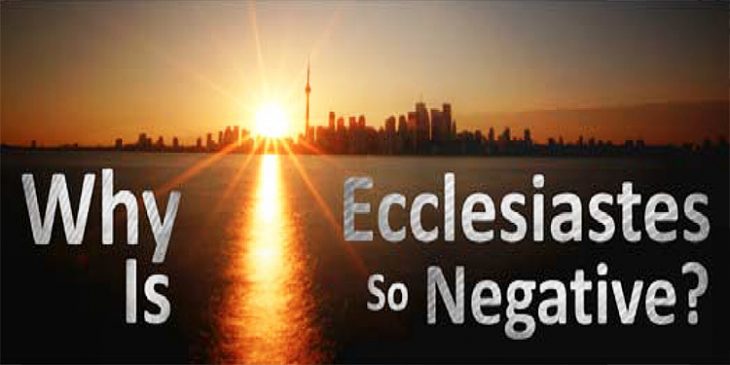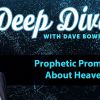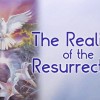Why is Ecclesiastes so negative?
[Note: Co-written with Dennis Pollock of Spirit of Grace Ministries.]
In my opinion, Ecclesiastes has to be the strangest book in the Bible. It begins with an evaluation of life with which no Christian today would ever agree: that life is vain and purposeless. Solomon begins his strange thesis about life on earth with the words: “Vanity of vanities, all is vanity.” In using the word vanity, Solomon is not talking about ego. He is declaring that life is vain — all life, all our lives, all our activities and all that happens “under the sun” (one of his favorite expressions) is in vain and without any real purpose.
This is hardly a Christian worldview. We who are in Christ see life as incredibly significant and purposeful. We must wonder, “How is it that Solomon could be so gloomy?” The general tenor of the book of Ecclesiastes seems more philosophical than theological, and it is a pretty gloomy philosophy at that.
We must understand that during the days of the Old Testament, there was no widespread revelation of eternal life. In fact, the Old Testament says very, very little about the afterlife — so little that there was a major theological group existing in Jesus’ day who firmly insisted that there was no afterlife. Once you died, that was it, so if God was pleased with you, you could be sure you would be blessed in this life — since there were no blessings and indeed no life at all after death. This group was known as the Sadducees. Their main argument for believing as they did was by reason of omission — you just couldn’t find plain, clear references to Heaven or any life after death in the writings of Moses (Genesis through Deuteronomy).
Early Sadducee
Solomon seemed to be of this persuasion, long before the Sadducees appeared on the scene. He had a great life for the present. He was the king of Israel, and the wealthiest and wisest man on earth. He had all his heart could want, in possessions, wives, concubines, entertainers, gold, silver and just about anything and everything a man of his times could ever desire. He was a royal and he lived royally.
But as Solomon aged, something began to bother him. The reality of his own eventual death became more and more depressing to him. Sure, he had it all for now. And he would probably enjoy these blessings for a while. But sooner or later, he would do as all the rest of the world did. He would age, he would weaken, and he would finally die and leave everything. Every bit of his gold and silver, all his wives, all his servants, all his fancy robes and crowns, everything he possessed, all he had accomplished and all which gave him such pride and satisfaction would remain, but he would be gone.
Throughout the twelve chapters of the little book of Ecclesiastes, the gloomy king complains again and again about this inevitable and irresistible conclusion to human life. Let’s consider a few of his ramblings on this subject. In chapter one we read (Ecclesiastes 1:3-4 – NKJV):
What profit has a man from all his labor in
which he toils under the sun? One generation
passes away, and another generation comes.
Solomon was a hard worker. Throughout his life he was constantly building, creating, and improving Jerusalem. He took much pride in his accomplishments, but it just didn’t sit well with him that one day he would die and all his labor, all his efforts, and all his accomplishments would fall into the hands of others. He uses a phrase here that we will see repeated throughout the book. That phrase is: “What profit…?” He might have said, “What good does it do?” Regardless of how skilled we are and how hard we work, and all that we manage to accumulate, it will all at some point be unceremoniously ripped from our cold, dead hands. So what is the point?
No Remembrance
Later in the first chapter, Solomon laments the fact that the day will probably come when he will be entirely forgotten and receive no credit by future generations for all he has done. He states: “There is no remembrance of former things, nor will there be any remembrance of things that are to come by those who will come after” (Ecclesiastes 1:11). Not only will he die and have to leave everything behind, but in future generations everything he has done, all his labors and triumphs and sorrows and memories will be forgotten. What’s the use?
In the second chapter Solomon carries this theme further still. He writes (Ecclesiastes 2:14-16):
The wise man’s eyes are in his head, but the
fool walks in darkness. Yet I myself perceived
that the same event happens to them all. So I
said in my heart, “As it happens to the fool, It
also happens to me, and why was I then more
wise?” Then I said in my heart, “This also is
vanity.” For there is no more remembrance of
the wise than of the fool forever, since all that
now is will be forgotten in the days to come.
And how does a wise man die? As the fool!
Solomon feels it would be acceptable if only fools and wicked people died, while the wise and righteous people live on. But to his consternation, it doesn’t happen this way. Wise men die as well as fools, godly people die right along with the wicked. And to make matters worse, wise men are forgotten just about as quickly as the fools! No matter how much you accomplish, no matter how many people you help, no matter how high you may rise in this life, you will die right alongside the village idiot and both of you will eventually be forgotten. It just isn’t fair!
What Solomon was saying and seeing was not something particularly novel or brilliant. Everybody knew that death was both real and inevitable, from the peasant farmer to the highly educated scholar. But Solomon felt it far more keenly than most. Perhaps this was partly because he had so much to lose.
But another reason was simply the very nature of the man. Solomon was by temperament a philosopher. He didn’t just observe life; he thought about it, analyzed it, pondered its meaning and desperately tried to make sense of it all. But he could never get around the immoveable, impenetrable, distasteful reality of death — particularly the thought of his own death.
Dead Like a Dog
As the gloomy king observed life and death, he came to a miserable conclusion: the deaths of men and women aren’t all that different from the deaths of animals, which made him wonder if we are all that superior to the beasts. He wrote (Ecclesiastes 3:18-20):
I said in my heart, “Concerning the condition
of the sons of men, God tests them, that they
may see that they themselves are like animals.”
For what happens to the sons of men
also happens to animals; one thing befalls
them: as one dies, so dies the other. Surely,
they all have one breath; man has no advantage
over animals, for all is vanity. All go to
one place: all are from the dust, and all return
to dust.
Who is wiser: a dead man or a dead dog? Who is happier: a dead lady or a dead mouse? As Solomon pondered these questions — questions which few men and women ever paused to consider — he came to some unhappy conclusions. Although men and women may be smarter and cleverer and accomplish far more than the animals, we all die the same way. We all appear to go into a state of eternal unconsciousness where we see nothing, do nothing, say nothing, enjoy nothing and are, in effect, non-existent.
It was not a pleasant thought, especially for the philosophically-minded king who had so much to lose at life’s end, and had so much time to think about it while he still lived. And as he wrote this little book we call Ecclesiastes, these kinds of melancholy thoughts and meditations were freely distributed throughout his essay.
A Severe Evil
As we move through the book, we find more of the same (Ecclesiastes 5:15-16):
As he came from his mother’s womb, naked
shall he return…
And he shall take nothing from his labor…
And this also is a severe evil —
Just exactly as he came, so shall he go.
This idea of dying, and being unable to take even the smallest possession or accomplishment with you seems to Solomon a great tragedy. He does not call it evil; he declares it is a “severe evil.” It is strange that what billions of men and women have accepted without much thought (the idea of our eventual death) throughout earth’s history, is to Solomon a huge problem. This is not some small thing; this is a big, big deal!
And of course he is right, if you subtract God and Christ, and the promise of eternal life through Christ, from life’s equation. Without the hope Jesus gives, life becomes a cruel joke, a terrible Shakespearian tragedy foisted upon billions of people who live out their lives, and work and sweat, and attempt great things, as though life has some purpose, which in fact it surely does not — if there is nothing beyond the grave.
If the soil and the worms and a permanent state of extinction and non-existence are the destiny awaiting every one of us, what does it matter whether we live nobly or poorly, whether we achieve much good or no good at all, whether we try with all our might to “make our lives count” or live selfishly and foolishly all our days? Eventually even our earth itself will cease to be and all the struggles and accomplishments and the collective memories of billions of people and families and nations will be erased with a permanent, cosmic deletion. No one will be left to know or care or remember anything any one of us ever did or said or wrote or achieved.
Solomon concluded that in light of all of this, the only thing we can do is to try to enjoy our vain lives while we still live: “So I commended enjoyment, because a man has nothing better under the sun than to eat, drink, and be merry…” (Ecclesiastes 8:15). Paul recalled this statement as he wrote in his epistle to the Corinthians about the resurrection from the dead. He made the point that apart from a hope of eternal life through Jesus Christ, “If the dead do not rise, ‘Let us eat and drink, for tomorrow we die!'” (1 Corinthians 15:32).
Vivid Contrast
We may be tempted to wonder why God would include this pessimistic, melancholy little book in the Holy Scriptures, particularly since its tone entirely contradicts the writings of the Apostles, and the teachings of our Lord Jesus. Does God really want His children going around spouting: “It’s all vanity. Life has no purpose. We might as well eat and drink it up, for we’ll all soon be dead!”
I am convinced that God wanted to give us a vivid picture of what life would be like apart from the hope that springs through the Cross and resurrection of Jesus Christ. Solomon had no such hope. In his mind the grave was a place of total cessation: all joy and work and consciousness end when we take our last breath. Solomon wrote: “Whatever your hand finds to do, do it with your might; for there is no work or device or knowledge or wisdom in the grave where you are going” (Ecclesiastes 9:10).
This is the polar opposite of the theology espoused by the Apostle Paul, who wrote: “But if I live on in the flesh, this will mean fruit from my labor; yet what I shall choose I cannot tell. For I am hard-pressed between the two, having a desire to depart and be with Christ, which is far better” (Philippians 1:22, 23).
What a contrast! Solomon sees death as the ultimate enemy; Paul sees it as a doorway to a greater life with His Savior, Jesus Christ. Solomon sees it as loss; Paul sees it as gain. This sure and joyous expectation of a life after this life in the presence of Jesus is known biblically as our “Blessed Hope” (Titus 2:13).
But this idea of hope is more than wishful thinking. It is a glorious looking forward to a wonderful future that Jesus has promised us. And with this hope, we can endure all things, counting them, as Paul did: a “light affliction, which works for us a far more exceeding and eternal weight of glory.”
Afterthoughts by Dr. Reagan
I’m sure many of you must be thinking at this point, “How could one of the wisest men who ever lived end up with such a pessimistic, unbiblical view of life?”
Not only was Solomon gifted with great wisdom (1 Kings 3:5-14 and 4:29), he was also a man who believed in God and who greatly honored his Creator when he dedicated the Temple in Jerusalem. On that occasion, he offered a sacrifice to the Lord of 22,000 oxen and 120,000 sheep (1 Kings 8:63). He also led the priests and the people in a magnificent prayer that began with these words: “O LORD, the God of Israel, there is no God like You in heaven above or on earth beneath, keeping covenant and showing lovingkindness to Your servants…”
Solomon is also the one who wrote the following words, recorded in Psalm 72 (NASB):
18) Blessed be the LORD God, the God of
Israel, Who alone works wonders.19) And blessed be His glorious name forever;
and may the whole earth be filled with His
glory. Amen, and Amen.
Why the Depression?
So, why all his despair in the book of Ecclesiastes? Well, as Dennis Pollock so well points out in his article, Solomon did not have a clear conviction of life after death. And so, as he approached death, he began to wallow in self-pity over the seeming meaninglessness of life. He was wrestling with the idea that “we are here today and gone tomorrow,” soon to be forgotten like a dead dog.
But there is more to it than that. Despite his wisdom and his spirituality, there came a point in Solomon’s life when he got his eyes off God and strayed significantly from the center of God’s will for his life. There were problems from the beginning. He was hardly coronated as king when he decided to engage in a political marriage with one of the daughters of the Egyptian Pharaoh (1 Kings 3:1). This act constituted a severe violation of God’s command against marriages with non-Hebrew women (Deuteronomy 7:3-4). He also burned incense on high places that were dedicated to false gods (1 Kings 3:3).
The Descent into Apostasy
The turning point in Solomon’s life occurred in the year that he received 666 talents of gold (1 Kings 10:14). From that point on, almost to the end of his life, he was obsessed with money, horses and women (1 Kings 11:1-8 and 2 Chronicles 1:14-15).
In the process, he became deeply involved in idolatry, paying tribute to Ashtoreth (the goddess of the Sidonians), Milcom (the god of the Ammorites), Chemosh (the god of Moab) and Molech (the god of Ammon). As the Scriptures put it, “his heart turned away from the Lord, the God of Israel” (1 Kings 11 :9).
Looking back at this turning point in Solomon’s life, is it any wonder that the number, 666, came to symbolize apostasy? Undoubtedly, it is the reason the number is used in Revelation 13:16-17 to signify the coded name of the Antichrist.
I believe Solomon wrote the book of Ecclesiastes while he was caught up in his spiritual apostasy, and it is therefore an expression of the emptiness of a life being lived in rebellion against God.
The Revival
But the good news is that Solomon must have repented before his death and was reconciled in his relationship with God. This is reflected in the final chapter of Ecclesiastes which begins with his admonition to young people: “Remember also your Creator in the days of your youth, before the evil days come and the years draw near when you will say, ‘I have no delight in them'” (Ecclesiastes 12:1). It’s pretty obvious that he is speaking of his own experience.
Further, in verse 5 he refers to the dead going to their “eternal home.” He declares that the body will return to dust, but “the spirit will return to God who gave it” (verse 7). He even refers to judgment after death (verse 14), and judgment by God certainly gives meaning to how we live here and now.
This last chapter of Ecclesiastes clearly indicates that Solomon got his eyes back on God, either by special revelation about the reality of life after death, or else through the Holy Spirit directing him to relevant passages in the portions of God’s Word that existed at that time.
Resurrection Scriptures
One of those passages is contained in what scholars consider to be the oldest book of the Bible — the book of Job. In Job 19:25-27 the author affirms that a day will come when he will be resurrected and stand before his Redeemer here on earth.
Resurrection to eternal life for believers can also be found in the writing of Solomon’s father, David. In Psalm 16:10, David says he is confident that his soul will not be abandoned in Sheol (the holding place of the spirits of the dead). And in the next psalm, David declares that he will one day “behold the Lord’s face” when he awakens from the dead (Psalm 17:15).
In Psalm 133:3, David speaks of “life forever.” And in his most famous psalm, David proclaims that believers “will dwell in the house of the LORD forever” (Psalm 23:6).
The sons of Korah, a priestly choral group from the time of David, affirmed the resurrection of the soul in Psalm 49:15 where they wrote: “God will redeem my soul from the power of Sheol, for He will receive me.” The prophet Asaph, also a contemporary of David, wrote in Psalm 73:24 that a day will come when believers will be “received to glory.”
In the Hebrew Scriptures, there are many other references to resurrection and eternal life for believers, but the ones cited above should have been available to King Solomon.
Conclusion
As he read these passages from his father and his contemporaries, King Solomon must have begun to understand that life really does have meaning and so does the way we live it. This resulted in his ending his maudlin book in chapter 12 with these glorious words of triumph:
13) The conclusion, when all has been heard,
is: fear God and keep His commandments,
because this applies to every person.14) For God will bring every act to judgment,
everything which is hidden, whether it is good
or evil.
His declaration that all of us will face judgment before God for the way we live gives meaning to life. So, as Solomon faced death, he must have ceased his repetitious muttering of “vanity, vanity, vanity!” Instead, his heart must have been filled with rejoicing that he would see his God.








I was 19 years old when Ecclesiastes first grabbed me. I was raised Christian and accepted Jesus as my savior, under the powerful preaching of a southern Baptist evangelist, when I was 8 years old. At 19 I was wondering about life itself. I was in a library and as I walked by a large selection of Bibles I stopped and pulled one of the shelf. I flipped through it and stopped on the little book of Eccleasties. I began reading it and could not put it down until I had finished reading it. I went straight from that library to a Christian book shop and purchased that translation. I still have that James Moffit Bible as I am nearing 80. The wonderful little book of Ecclesiastes speaks powerfully to the hurting and hungry heart.